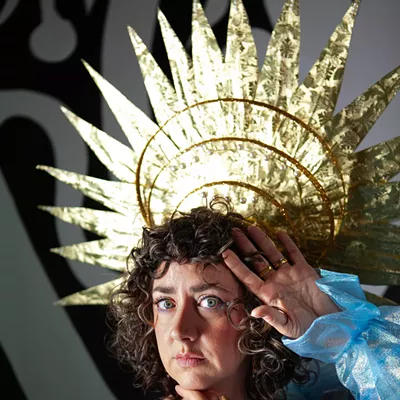The Waybacks are coming... back. Not the Wayouts, those spazzy, spring-loaded prehistoric harmonizers from the town of Bedrock, but the Waybacks, that San Francisco-based crew of newgrass acoustinauts with chops aplenty, a winning sense of humor and a healthy disrespect for convention.
The Waybacks (who make a return trip to Spokane next Thursday at the Met) stand on the forward shores of the new American acoustic music, the confluence of bluegrass, western swing, jazz, folk and dozens of derived stylistic springs. The group's lively compositions and energetic, unpredictable translations are by no means traditional, staid or static. In the Waybacks' playbook, tradition is considered a great starting point, but a place in which you wouldn't want to get stuck. To this robust and eclectic instrumental mix, they add multi-part harmonies and a performance style that has an uncanny way of turning doubters into converts.
Who are these lads? Well, now, without any further ado, let's introduce the players, all of whom -- with one exception -- also pull singing duties.
Nashville native James Nash (lead guitar, mandolin) has had some stringed instrument or another in his mitts since age 9. After spending his high school years studying with Nashville session regular Jerry Kimbrough, he headed out West and was plucked by a San Francisco-based alternative melodic rock band before picking up the mandolin and rediscovering his bluegrass roots. Chojo Jaques (fiddle, mandolin, guitar, Humanatone) ditched the piano for a guitar at an early age and went on to cut his teeth (and callous the hell out of his fingers) playing in a truck stop bar band in East Missoula. He took up the mandolin while touring with the Lost Highway Band, ended up in the Bay Area in the '80s and has performed and/or recorded with Ramblin' Jack Elliot, Johnny Paycheck, Frank Wakefield and Michael Hedges, among others. Six-string stylist Stevie Coyle (rhythm and fingerstyle guitar) taught himself guitar by listening to old Ventures albums and taught himself to fingerpick while touring the U.S. with the Royal Lichtenstein Circus. Montana-born, Chuck Hamilton (drums and percussion) is the only Wayback who doesn't sing. Though he studied drums formally in high school and college, his real training was acquired while touring with the Lost Highway Band during the late '70s. Joe Kyle Jr.'s (standup bass) dad's extensive jazz record collection first lit a fire under his behind. After years of attempting to disavow his true calling, Kyle caved, picking up his first instrument in 1990. Since then he has become a major player on the San Francisco live music scene, known for his instrumental agility, adaptability, humor and for occasionally destroying his instrument.
Now that this Waybacks meet and greet is concluded, you probably have a pretty good idea of what you can expect from these guys, right?
Don't be so sure.
Burning Desire -- The Spokane minions of A.F.I. will be headed out in droves next Monday to show their support and adoration for their favorite punk/metal heros -- and bear witness to the reasons the band so quickly sold out downtown's 800-seat Met theater. These people are ready to throw themselves on the mercy of one heavy live show. The rest of you might be wondering what all the fuss is about. For starters, don't judge these guys solely on the basis of their current hit single that can be found everywhere across the country on the commercial airwaves and on that we-shall-not-utter-its-name music television station. This band has paid its dues. And then some. To paraphrase an oft-quoted A.F.I. lyric: through their bleeding, they are one.
A.F.I. (A Fire Inside) has been kicking out the jams and flying under the radar since 1995. Early on, its strict adherence to the DIY punk ethos garnered the band a meager but loyal following. The group used raw energy and straightforward anthems of alienation to cut deep into the ears and minds of listeners. From a purely instrumental standpoint, A.F.I didn't look to break too far out of the box. Rather, the members used a somewhat standard approach in constructing their brand of punk-infused metal, allowing them to concentrate on their message and not on shattering the boundaries of the genre. However, A.F.I. is no one-trick pony. While their early sound seems, in retrospect, unrefined, the group's sonics have evolved considerably as it has grown into a ferocious yet polished studio and live act.
This shift in sound and subsequent commercial success can be attributed to a lineup change that brought guitarist Jade Puget into the A.F.I. fold that now also includes Davey Havok (vocals), Hunter (bass) and Adam Carson (drums). Puget's intricate writing and fish-to-water guitar style propelled the band forward into new instrumental territory. Just about this time in the band's history, one of its songs, "Totalimmortal" began receiving heavy radio rotation nationally. Even though it was the Offspring's version of the A.F.I. song that hit big, the result was a heightened awareness of the band's potential among industry watchers. The group seized upon this opportunity to springboard into the national spotlight with its next album, 2000's The Art of Drowning, which brought the band national tours, stints in Europe and solidified its standing as legitimate and marketable.
In 2003, the A.F.I. machine is bigger and better. It released the Butch Vig-produced Sing The Sorrow (the band's major label debut on DreamWorks) in March and has since been tearing up modern rock radio with the hit single "The Leaving Song Pt. II". As the lucky ticket holders to the band's Spokane show will no doubt attest, the A.F.I. phenomenon continues to roll forward.
Northwest Best -- It's all fine and dandy to revisit and pay homage to those who came before, to pay tribute to those luminaries who established, energized or popularized your chosen art form. But to keep things alive and moving forward, there also needs to be recognition of the contemporary -- and of the regional mutations that keeps art, in particular American popular music, so vibrant and vital to the culture. That was the thinking behind the Spokane Jazz Orchestra's 29th season opener at the Met theatre this Saturday night, which features music written by Northwest composers. That's right, the SJO is bringing it all back home.
Under the skillful direction of Music Director Dan Keberle, the 18-piece jazz orchestra will present a full evening of new, contemporary jazz by composers and arrangers who possess close ties to Spokane and the Inland Northwest. The program includes both familiar tunes set to new arrangements and brand-spanking-new compositions, some of which will be performed for the first time anywhere. Featured selections include an arrangement of "My Shining Hour" by Tom Molter, and a composition by Daniel Barry based on "To and Fro," a Brazilian folk song. Add to that new compositions by Jim Cutler, Ryan Keberle, Dan Keberle, Greg Yasinitsky and Spokane Jazz Orchestra's first music director, Bruce Preuninger (a composition he wrote for the dedication of the remodeled Lewis and Clark High School called "Comin' Home"), and you've got yourself an entire evening packed with fresh, new music and what will undoubtedly be some inspired performances.
Publication date: 10/16/03















